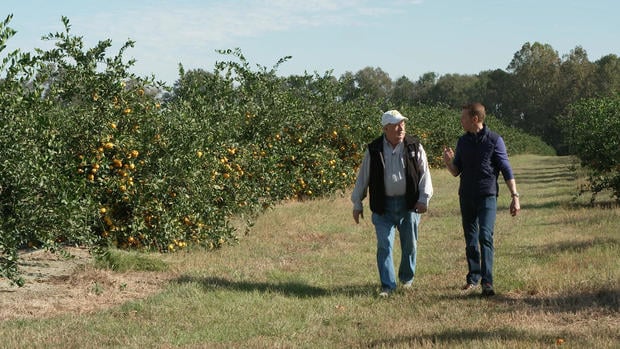November 27, 2025 | 19:32 GMT +7
November 27, 2025 | 19:32 GMT +7
Hotline: 0913.378.918
November 27, 2025 | 19:32 GMT +7
Hotline: 0913.378.918

In the middle of Georgia, Joe Franklin's 78-acre citrus farm is growing fruit you'd normally expect to find hundreds of miles south in Florida.
The most unusual thing about Joe Franklin's 78-acre citrus farm is that it really shouldn't be where it is. "When I first started with it, people couldn't believe me when I told 'em it was grown right here in Georgia," they said. "They didn't believe me; 'Oh, no, you can't grow that here!'"
But Franklin now has 12,000 trees, growing fruit in the middle of Georgia you'd normally expect to find hundreds of miles south in Florida: Grapefruit, Meyer lemons, mandarins, mangoes.
Correspondent Ben Tracy asked, "So, I'm not gonna find a Georgia peach anywhere on this land?"
"No, afraid not," Franklin replied. "One of the main things that drove my decision to plant 'em was the fact that it is so much warmer now than it was 30 years ago, 40 years ago. I know when I was growing up, golly, in October, you always had a couple of frosts. And November, you usually had a freeze. That doesn't happen anymore."
"Did you think of that as climate change, or did you just say, 'Something's different here'?"
"No, I thought it was climate change," he replied. "It's happening. There's no doubt about it."
"A lot of crops – not just in the U.S. but also in Africa, India – are already seeing the impacts of climate change," said Himanshu Gupta, CEO of San Francisco-based startup Climate Ai. The stakes are high: as the planet warms and climate change fuels more severe drought and flooding, it's estimated worldwide crop yields could decline up to 30% by the year 2050 (according to a report by the Global Center on Adaptation).
Gupta showed Tracy how the cranberries on our Thanksgiving tables will likely have to be grown significantly further north in the coming decades. Climate Ai's platform uses machine learning to identify climate risks for agricultural producers. "Using that, you can tailor your recommendations for the food companies or seed companies or for farmers," Gupta said.
Dramatic shifts are already happening: there's now coffee from California, and fine wines from England.
But while warmer temperatures may benefit some crops, they can devastate others.
In Georgia, the state's famed peach trees require significant winter chill in order to bloom come spring. Pam Knox, an agricultural climatologist at the University of Georgia, said winters in the state have warmed on average more than three-and-a-half degrees since the 1800s, enough to put many varieties of peaches at risk.
Researchers are racing to develop new warmer weather varieties to take their place.
Tracy asked, "As warming continues, should we expect crops to kind of migrate north in some fashion, things that needed to be further south in the past?"
"There will be some migration," Knox replied. "There's some limitations to that: The kind of soil you have, whether you have access to irrigation, what you've grown traditionally. Because if you're a peach producer, you're probably not gonna suddenly switch to cattle."
Joe Franklin's citrus bet is paying off, but he knows a changing climate likely means more losers than winners.
Tracy asked, "For this to be working here means it's probably not working so well for somebody further south?"
"Right. Exactly."
"Do you think about those folks?"
"I do. And I feel for 'em," Franklin said. "And it's a gamble. It's a risk you take, you know? It's one of them things."
(CBS News)

(VAN) A new study reveals how the simultaneous effects of ocean acidification, salinity and loss of oxygen are making the world more fragile.

(VAN) Hopes are growing that the creation of the first 3D turkey gut model could be a turning point in the battle against the virulent blackhead disease.

(VAN) Tyson, America’s biggest meat supplier, plans to shutter one of its largest beef processing plants as the industry continues to struggle with low cattle supplies and political pressure from Washington.

(VAN) New FAO study shows how digital solutions are empowering farmers and fishers to prevent losses and build resilient agrifood systems.

(VAN) Brazil's COP30 presidency pushed through a compromise climate deal on Saturday that would boost finance for poor nations coping with global warming but that omitted any mention of the fossil fuels driving it.

(VAN) Poultry farmers in the UK have been warned that they could face one of the worst winters yet for bird flu.

(VAN) Prices of main-crop paddy have risen sharply, with jasmine rice hitting 16,100 baht per tonne — the highest level in years.